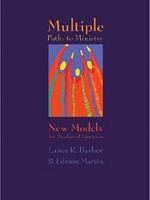 Mainline denominations talk a lot about empowering the laity and the "priesthood of all believers," but when it comes right down to it, the seminary trained, duly ordained, serving a congregation remains the prevailing model. And one that no longer works for a large percentage of North American churches, according to the Lilly Endowment-funded research project by Lance Barker and Edmon Martin, both retired professors at United Theological Seminary of the Twin Cities. However, the well-documented clergy shortage is only a crisis if churches and denominations refuse to re-image theological education, say Barker and Martin in Multiple Paths to Ministry: New Models for Theological Education.
Mainline denominations talk a lot about empowering the laity and the "priesthood of all believers," but when it comes right down to it, the seminary trained, duly ordained, serving a congregation remains the prevailing model. And one that no longer works for a large percentage of North American churches, according to the Lilly Endowment-funded research project by Lance Barker and Edmon Martin, both retired professors at United Theological Seminary of the Twin Cities. However, the well-documented clergy shortage is only a crisis if churches and denominations refuse to re-image theological education, say Barker and Martin in Multiple Paths to Ministry: New Models for Theological Education.
Without disparaging traditional theological education, this collection of essays invites us into worlds outside the walls of academia where theological study is fully realized. The "multiple paths" include the United Methodist Course of Study Program, the United Church of Christ's Southern Conference Ordination Preparation Education program, and the commissioned lay pastor program of the Presbyterian Church (USA). These programs mimic the Master of Divinity degree in many ways, preparing lay pastors to serve small congregations. While necessary, these efforts seem more like stopgap measures than creative solutions.
But two dynamic and highly creative solutions appear in Multiple Paths, and they hold promise for a new vision of ministry. One is the Mutual Ministry program of the Episcopal Diocese of Northern Michigan, which trains church members for Ministry Support Teams that serve in place of an ordained clergyperson. Team members — chosen because of their gifts for particular aspects of ministry — spend considerable time in small group training and Bible study with a "missioner" who serves as a diocesan appointed mentor or guide. Churches involved in "mutual ministry" report an unleashing of spiritual energy in becoming "a ministering community rather than a community gathered around a minister."
The other progressive program is the Dr. Jessie Saulteaux Resource Center (DJSRC) of the United Church of Canada, founded in 1980 as an Aboriginal community-based learning program for ministry after tribal leaders noticed that the people they sent away for theological education came back "speaking a different language." As a result, the Center refuses to imitate Anglo-European seminary training with its emphasis on lectures and methods. Rather it seeks to foster a love for biblical studies and pastoral care through inductive learning and small group experiences. It is a culturally specific preparation for ministry, honoring traditional Aboriginal values and spirituality and, most important, keeping the students in the community that they know, love, and will serve.
Key to each of these new paths is a commitment to finding our Christian identity in baptism, not ordination. Barker and Martin hope the new models will liberate congregations from old ideas about what makes a church viable. Seminaries, in turn, need to be liberated from the exclusive hold of academic hegemony and become simply one (albeit important) link in a whole chain of theological education dedicated to breathing new life into congregations.
Multiple Paths is an inspiring, invigorating look at how the Spirit is transforming our vision of church.